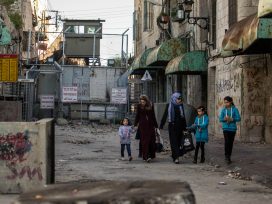The increasing ability of external forces to interfere in the affairs of formally independent political communities poses a profound challenge to the traditional understanding of states as autonomous sovereign entities. The loss of what Jürgen Habermas calls the nation-state’s ‘steering capacity’ is visible across a variety of issues, from migration and climate change to fiscal policy, where the International Monetary Fund increasingly dictates policy to debtors. Frequently associated with increasing globalization, citizens often experience this phenomenon as part of a more generalized loss of control in the face of international markets, multinational corporations and the phenomenon of global interconnectedness more generally.
Despite these negative aspects, the opening of the state to outside influences also has the potential to empower regular citizens. Most notably, among its many other consequences, this hollowing out of sovereignty has transformed international criminal law from a lofty ideal into an enforceable reality. Understood as the need to address crimes committed by a previous regime, since 1989 the world has witnessed what scholar of international relations Kathryn Sikkink calls a ‘justice cascade’ that has made amnesties and other forms of impunity for gross violations of human rights increasingly indefensible. Most obviously, the doctrine of sovereign immunity, which protected state officials from prosecution, is becoming a historical artefact. The development of this global justice norm has the potential to empower local populations and victims to hold their erstwhile oppressors to account for crimes against humanity.
The indictments of former Serbian President Slobodan Milošević and other high-ranking war criminals from Serbia, Croatia and Bosnia-Herzegovina by the International Criminal Tribunal for the former Yugoslavia (ICTY) testify to this revolution in accountability. However, although it achieved much in documenting and prosecuting the perpetrators of the atrocities committed during the Yugoslav Wars before its closure on 31 December 2017, it is hard to see the Tribunal as a success. Instead of stimulating renewed cooperation among the warring ethnic groups, in most cases the ICTY reinforced pre-existing nationalist narratives, entrenching what legal scholar Martha Minnow calls the ‘cycles of hatred’ that engulfed the Balkans after the breakup of Yugoslavia.
Examples of the ICTY’s failure to promote peace, reconciliation and justice abound. Despite the gruesome facts that emerged from the trial that was interrupted by the premature death of the ‘Butcher of the Balkans’ in 2006, Milošević is still considered a national hero in Serbia. This status is made clear by public opinion polls and the pilgrimages to his grave in Požarevac, as well as by proposals to erect a statue of him and name a park in his honour in Belgrade. The situation is no better in other parts of the former Yugoslavia. Most strikingly, the Bosnian Croat wartime commander Slobodan Praljak – who dramatically drank poison in front of the Court when his sentence was upheld in one of the ICTY’s last public hearings on 29 November 2017 – was hailed as a war hero in Croatia after his suicide. The Archbishop of Zadar and head of the Croatian Conference of Bishops, Želimir Puljić, went so far as to condemn the Tribunal for its ‘unjust verdicts’, praising Praljak for ‘giving his life for the truth’. Even the Bosnian Muslim community, which initially viewed the tribunal as a beacon of hope, quickly came to see it as a legalistic institution that had little relevance to their experiences, perceptions and feelings.
The ICTY has undoubtedly played an important role in furthering the global justice norm by holding the génocidaires of the former Yugoslavia to account for their crimes, producing a formal record of the atrocities, strengthening the rule of law, establishing legal procedures for international prosecutions and laying the groundwork for the creation of the International Criminal Court (ICC) in 1998. However, the failures of the ICTY are equally glaring. Despite the reams of evidence produced in the course of its prosecutions, the ICTY has not succeeded in creating an authoritative history of events that is accepted by all sides. It even failed in its most basic task – preventing future acts of genocide – given that the greatest single atrocity of the Yugoslav Wars, the massacre of over 8,000 innocent Muslim Bosniaks at the town of Srebrenica in July 1995, occurred after the Tribunal had been established in May 1993.

The first session of the ICTY in November 1993. Source: Flickr
How can we square the ICTY’s substantive achievements in promoting international criminal law with its failure in promoting peace, reconciliation and justice within the former Yugoslavia? The easy answer is that we cannot. The experience of the ICTY teaches us that international prosecutions cannot serve as the sole or even the main instantiation of the new global justice norm. Instead, we must develop a more holistic understanding of transitional justice that includes other mechanisms as well, such as Truth and Reconciliation Commissions (TRCs), truth-telling initiatives and individual bans from public life on the European model of lustration.
Although I welcome the development of international criminal law, my basic thesis is that international tribunals are inadequate vehicles of justice both because they are divorced from the communities in which the atrocities occurred and due to their denial of the agency of the victims at the local level. Far from furthering transitional justice, these high-profile trials often hijack domestic efforts at societal reconciliation. In my understanding, transitional justice should focus on the local level, helping individuals within the traumatized communities in question to participate in the desirable, if contentious, intergroup dialogue necessary for all sides to acknowledge that crimes against humanity are not morally ambiguous. Based on the ambiguous record of the ICTY, I argue that the global justice norm should aim to empower local communities to recognize their mutual humanity, allowing them to live together once more.
Despite its potential to crack open the arbitrary protection that Westphalian state sovereignty has historically offered to war criminals, implementing transitional justice through international criminal law has many pitfalls. The issue of distance is perhaps the most obvious and immediate problem. While situating trials outside of the community in which the atrocities occurred may make sense in terms of security and fairness for the accused, it also makes it more difficult to gather evidence, since international tribunals do not have the power to arrest suspects and subpoena witnesses.
Although some of the issues of physical distance were visible in how the ICTY worked, its implications have even more important psychological consequences. Local trials and other mechanisms of transitional justice, such as TRCs, which allow victims to sit in on their proceedings, send a powerful symbolic message by putting the powerless into positions of judgment. The fact that the ICTY was located in The Hague, thousands of kilometres from the killing fields of the former Yugoslavia, meant that the victims and their families were denied access to the work of the Tribunal. This remoteness reinforced the impression of the ICTY as an institution designed to assuage the guilt of the international community for failing to prevent genocide, rather than one that actually cared about bringing justice to the victims and their families.
The issue of language also presents important obstacles. As judicial proceedings, international tribunals are locked into the largely inaccessible idiom of the law. Beyond the basic incomprehensibility of legal jargon to outsiders, the judicial process also affects what witnesses can and cannot say, denying them the psychological comfort of speaking freely about their traumatic experiences. It also limits the nature and scope of the evidence that can be presented to the court. Unlike TRCs and truth telling initiatives, which allow for the use of informal language, unrestrained testimony and documentation, the strict rules governing the conduct of legal trials offer the community a severely circumscribed record of events, which focuses only on the factors necessary to establish legal culpability.
These issues are magnified in the case of international tribunals, where simultaneous translation is necessary for judges, lawyers and witnesses to interact. The requirement usually benefits educated elites – most often the accused sitting at the dock – because they are able to follow the proceedings in the original language. By inhibiting access and participation, international tribunals operating in a foreign language fail to build relationships among the previously warring groups. They also reinforce the image of the Tribunal as a foreign, external imposition on the local community.
During his prosecution at the ICTY, Milošević was able to take advantage of the issue of language by giving all of his speeches in Serbian, using the trial to speak to his domestic audience back home. Whereas the judges and lawyers presented their evidence and accusations in English, the witnesses and the accused spoke in the native tongues of the communities where the events took place. Little wonder then that the local populations in the former Yugoslavia – who followed the proceedings of the ICTY live on television or saw key moments replayed on the nightly news – believed their fellow citizens speaking in their own language rather than the foreign ‘imperialists’ imposing justice from the outside.
Focusing on international tribunals as the primary location for justice also skews the subjects who are selected for prosecution. Given their high profile and exorbitant cost, such forums have traditionally targeted ‘higher ups’, arguing that scarce resources ought to be devoted to the political leaders who bear the greatest responsibility for the atrocities committed. In selectively focusing only on elite decision-makers, the international community risks sending the signal that whoever is not indicted by the ICTY is innocent.
An additional problem is that prosecuting high-level actors like Milošević does little to further justice in the eyes of those who suffered at their hands. Studies of post-conflict communities show that most victims care more about ‘individualized justice’ that acknowledges what happened to them and their loved ones than they do about the chain of command and organization of the killings. By focusing on the latter issues over the former, international proceedings do not provide the victims and their families with information they care about most, i.e. where mass graves are located or who was involved, focusing instead on who gave the orders for the killings.
Remitting high profile cases to the international criminal justice system also threatens to undermine local desires, placing the wants of the international community above those of the society in which the atrocities occurred. For example, in Serbia even the leader of the opposition, Vojislav Koštunica, opposed Milošević’s extradition to The Hague. Even more shockingly, the indictment of Milošević in 1999 did not address the war crimes committed by Serbian actors in Croatia or Bosnia. Instead, it focused solely on crimes committed by the Yugoslavian army and police in Kosovo, which was formally part of Serbia at the time. Although the decision to prosecute Milošević for crimes committed by organizations he directly controlled as commander-in-chief may have been legally sound, it undermined the ICTY’s standing among his victims.
Despite the fact that most Serbs opposed international efforts to extradite Milošević, there was considerable support for prosecuting the former president domestically. Despite the deficiencies of Serbia’s judicial system, there is even a good chance that Milošević would have been found guilty of abusing his office if he had been tried in Belgrade. Unfortunately, by the time he was indicted in Serbia in 2003, Milošević had already been turned over to The Hague in exchange for international economic considerations. Instead of destroying his political legacy and bolstering the legitimacy of the Serbian judiciary, the ICTY turned Milošević into a national hero and martyr.
The nature of the legal regime can also generate problems for international tribunals. In contrast to domestic judiciaries, which operate on a holistic legal architecture, international tribunals lack established codes of criminal procedure. The ad hoc rules adopted by courts like the ICTY are often fairly lax, allowing defendants to hijack the proceedings. This problem is highlighted in the example of the right to self-representation. In 2002 Judge Richard May, who presided over Milošević’s trial, set an important international precedent by ruling that although ‘the defendant has a right to counsel […] he also has a right not to have counsel’. This indulgence allowed Milošević to make political speeches throughout the trial, instead of only when he took the stand, as is the case for most defendants.
Milošević took full advantage of this opportunity, using each stage of the trial to address his domestic audience with presentations highlighting the devastation brought on by the international bombing campaign of Serbia by NATO in 1999. By representing himself, Milošević was able to sit alone at the dock, reinforcing his image as solitary patriot standing up to the oppression of the international community. He was also able to undermine the legitimacy and solemnity of the proceedings by treating witnesses and officers of the ICTY in a manner that would have landed a normal defence attorney in prison for contempt of court. A good speaker with a flair for the dramatic, Milošević soon succeeded in making even many outside observers lose respect for the proceedings.
As a result of all of these problems, it is hard to see the ICTY as a success. Looking back on its work from its establishment in 1993 to its closure at the end of 2017, it is clear that the ICTY has failed to bring justice to the victims of the Yugoslavian Wars. In fact, it seems to have inhibited the postwar recovery of the former Yugoslavia by further dividing the local populations of its successor states and delegitimizing the international community in the eyes of perpetrators and victims on all sides.
Perhaps the greatest achievement of the Tribunal has been its role in laying the groundwork for the creation of a permanent forum for international criminal law in the form of the ICC. This is an important step for international criminal law and the cascade of the global justice norm. Fortunately, the ICC has sought to address some of the issues raised by the ICTY. For example, it has minimized some of the language problems by providing a greater number of translators. The ICC has also sought to develop permanent legal procedures that resolve some of the problems raised by experiences of the ICTY, particularly in Milošević’s trial.
While I applaud these developments, they do not go far enough in tackling the social and political problems inherent within the paradigm of international criminal law. For example, adding more translators does not address the fact that operating in a foreign language undermines social reconciliation, nor does it solve the problem of what the legal forum allows witnesses to say in the first place. Instead of promoting what political scientist James Meernik refers to as ‘societal peace’, an overreliance on international tribunals as the main mechanism for the fulfilment of transitional justice threatens to undermine the hope that the development of the global justice norm gives to the victims of crimes against humanity around the globe.
Luckily, there is increasing recognition within the international community of the need to expand the horizons of global justice beyond international criminal law and the ICC. A 2004 report from the United Nations Secretary General to the Security Council on the ‘Rule of Law and Transitional Justice in Conflict and Post-Conflict Societies’ argued that ‘strategies must be holistic, incorporating integrated attention to individual prosecutions, reparations, truth-seeking, institutional reform, vetting and dismissals, or an appropriately conceived combination thereof’. Given the issues I have raised in reflecting on the legacy of the ICTY, it is clear that the model of the international tribunal is, on its own, inadequate as a response to the global justice norm.
Summing up these critiques, the main issue with international tribunals is that they usually become as much about historical truth and memory as they are about legal liability and punishment. Reflecting on the need for justice for the crimes committed by the Nazis in the aftermath of the Second World War, the German-Jewish philosopher Hannah Arendt argued that making international tribunals into vehicles of memory was a mistake, since ‘the purpose of the trial is to render justice, and nothing else’. Her mentor, Karl Jaspers, went even further, noting in a letter to Arendt that such trials are completely inadequate even in terms of justice, since the accused ‘stand outside the pale of what is comprehensible’. As a result, he argued, ‘Something other than the law is at stake here – and to address it in legal terms is a mistake’.
I do not go as far as Jaspers in seeing international criminal prosecutions as a mistake tout court. My critique of international tribunals is not an indictment of international criminal law, nor do I wish to shift the focus away from justice towards a ‘realist’ focus on expediency. On the contrary, after centuries of impunity the rise of the global justice norm is a welcome development.
However, I do want to argue that although international trials are an important part of transitional justice, they are only a part. My basic thesis is that international norms against impunity should be implemented domestically, taking local attitudes, mechanisms and traditions into account. Openness to the domestic level and to the fact that prosecution is not necessarily the be-all and end-all of historical justice will help both the international and the local communities to break out of the bifurcation between impunity and criminal tribunals. Allowing the individuals within transitional societies to debate and collectively determine how to implement transitional justice also makes this decision a part of the political process, which can help to bolster communal decision-making.
My argument about the importance of the local community in the implementation of transitional justice is not meant to overlook the problems of transitional societies in the aftermath of mass atrocities. In certain cases, it may indeed be necessary for international authorities to assist in or even to oversee the implementation of transitional justice. However, in doing so the international community must not forget that, as the American political theorist Judith Shklar put it, ‘The voices of the victims must always be heard first, not only to find out whether officially recognized social expectations have been denied but also to attend to their interpretations of the situation’. The implementation of the new global justice norm must always serve the victims and the social rehabilitation of local communities, not the guilt or desires of the international community.
A longer, peer-reviewed version of this article was published as ‘Against International Criminal Tribunals: Reconciling the Global Transitional Justice Norm with Local Agency’, in the Critical Review of International Social and Political Philosophy, on 6 December 2017. It will be published (in Slovenian) in a forthcoming edition of Razpotja.









